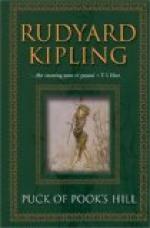’The yellow land lay on our left, the grey sea on our right. Knight though I was, I pulled my oar amongst the rowers. I caught seaweed and dried it, and stuffed it between the pots of beads lest they should break. Knighthood is for the land. At sea, look you, a man is but a spurless rider on a bridleless horse. I learned to make strong knots in ropes—yes, and to join two ropes end to end, so that even Witta could scarcely see where they had been married. But Hugh had tenfold more sea-cunning than I. Witta gave him charge of the rowers of the left side. Thorkild of Borkum, a man with a broken nose, that wore a Norman steel cap, had the rowers of the right, and each side rowed and sang against the other. They saw that no man was idle. Truly, as Hugh said, and Witta would laugh at him, a ship is all more care than a Manor.
’How? Thus. There was water to fetch from the shore when we could find it, as well as wild fruit and grasses, and sand for scrubbing of the decks and benches to keep them sweet. Also we hauled the ship out on low islands and emptied all her gear, even to the iron wedges, and burned off the weed, that had grown on her, with torches of rush, and smoked below the decks with rushes dampened in salt water, as Hlaf the Woman orders in her Ship-Book. Once when we were thus stripped, and the ship lay propped on her keel, the bird cried, “Out swords!” as though she saw an enemy. Witta vowed he would wring her neck.’
‘Poor Polly! Did he?’ said Una.
’Nay. She was the ship’s bird. She could call all the rowers by name.... Those were good days—for a wifeless man—with Witta and his heathen—beyond the world’s end. ... After many weeks we came on the great Shoal which stretched, as Witta’s father had said, far out to sea. We skirted it till we were giddy with the sight and dizzy with the sound of bars and breakers, and when we reached land again we found a naked black people dwelling among woods, who for one wedge of iron loaded us with fruits and grasses and eggs. Witta scratched his head at them in sign he would buy gold. They had no gold, but they understood the sign (all the gold-traders hide their gold in their thick hair), for they pointed along the coast. They beat, too, on their chests with their clenched hands, and that, if we had known it, was an evil sign.’
‘What did it mean?’ said Dan.
’Patience. Ye shall hear. We followed the coast eastward sixteen days (counting time by sword-cuts on the helm-rail) till we came to the Forest in the Sea. Trees grew there out of mud, arched upon lean and high roots, and many muddy waterways ran all whither into darkness, under the trees. Here we lost the sun. We followed the winding channels between the trees, and where we could not row we laid hold of the crusted roots and hauled ourselves along. The water was foul, and great glittering flies tormented us. Morning and evening a blue mist covered the mud, which bred fevers. Four of our rowers sickened, and were bound to their benches, lest they should leap overboard and be eaten by the monsters of the mud. The Yellow Man lay sick beside the Wise Iron, rolling his head and talking in his own tongue. Only the Bird throve. She sat on Witta’s shoulder and screamed in that noisome, silent darkness. Yes; I think it was the silence we most feared.’




